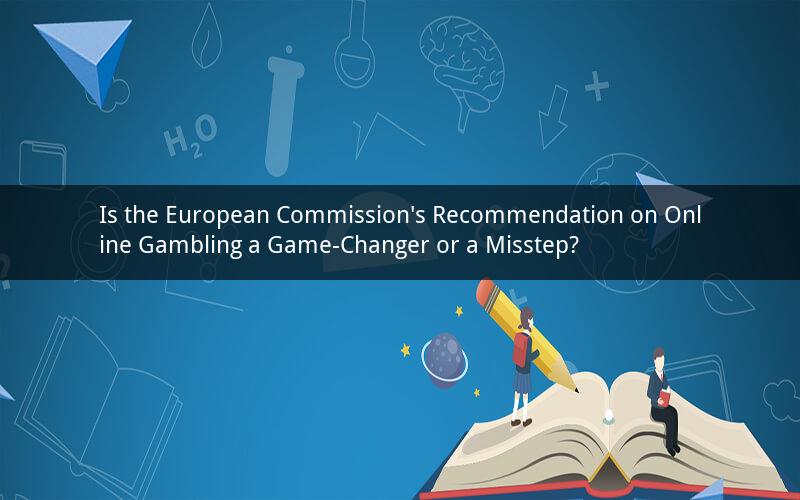
Table of Contents
1. The Landscape of Online Gambling
2. The European Commission's Role in Regulation
3. The Recommendation in Detail
- Key Provisions
- Impact on Operators
- Consumer Protection Measures
4. Comparative Analysis: Pre-Recommendation vs. Post-Recommendation
5. The Industry's Response
6. Consumer Perception and Impact
7. Legal and Ethical Implications
8. The Future of Online Gambling in Europe
9. Conclusion
---
1. The Landscape of Online Gambling
The digital age has transformed the gambling industry, with online gambling becoming a multi-billion-dollar sector. From virtual casinos to sports betting platforms, the convenience and accessibility of online gambling have revolutionized the way people engage with this form of entertainment. However, this rapid growth has also brought about numerous challenges, including addiction, financial fraud, and lack of consumer protection.
2. The European Commission's Role in Regulation
At the heart of European policy-making is the European Commission, which plays a pivotal role in shaping the regulatory framework for online gambling across the continent. The Commission's recommendations are not mere suggestions but are often the precursor to legislative changes that have far-reaching implications for the industry.
3. The Recommendation in Detail
Key Provisions:
The European Commission's recommendation focuses on several critical areas:
- Market Access: Ensuring a level playing field for operators across member states.
- Consumer Protection: Implementing stringent measures to safeguard consumers from addiction and fraud.
- Transparency: Mandating clear and transparent advertising and marketing practices.
Impact on Operators:
The recommendation has been met with mixed reactions from operators. While some view it as a necessary step towards a more regulated market, others fear it could stifle innovation and lead to increased bureaucracy.
Consumer Protection Measures:
The recommendation emphasizes the importance of self-exclusion schemes, deposit limits, and mandatory identification checks to prevent underage gambling and problem gambling.
---
4. Comparative Analysis: Pre-Recommendation vs. Post-Recommendation
Pre-Recommendation:
Before the recommendation, the online gambling landscape was fragmented, with varying regulations across member states. This led to a patchwork of laws that often favored operators over consumers.
Post-Recommendation:
The recommendation aims to harmonize regulations, creating a more unified and consumer-friendly market. However, the effectiveness of these changes remains to be seen.
---
5. The Industry's Response
The industry's response has been varied. Some operators have welcomed the recommendation, viewing it as an opportunity for growth and stability. Others have expressed concerns, fearing that the new regulations could limit their business models.
---
6. Consumer Perception and Impact
Consumers have shown mixed reactions to the recommendation. While many appreciate the emphasis on consumer protection, others worry that stricter regulations could limit their access to their favorite games.
---
7. Legal and Ethical Implications
The recommendation raises important legal and ethical questions. How can regulators balance the need for consumer protection with the freedom to choose? What role should governments play in regulating an industry that has the potential to be both entertaining and addictive?
---
8. The Future of Online Gambling in Europe
The future of online gambling in Europe will likely be shaped by the success or failure of the European Commission's recommendation. If implemented effectively, it could lead to a more regulated, safer, and transparent market. However, if the recommendation is viewed as overly restrictive, it could lead to a rise in illegal gambling and a loss of consumer trust.
---
Conclusion
The European Commission's recommendation on online gambling is a complex document that aims to address the challenges of an evolving industry. While its impact remains to be seen, it is clear that the future of online gambling in Europe will be shaped by the choices made today.
---
Questions and Answers
1. Q: How will the recommendation affect the number of online gambling operators in Europe?
- A: The recommendation is expected to lead to a reduction in the number of operators, as stricter regulations may make it more difficult for new entrants to establish themselves in the market.
2. Q: Will the recommendation lead to an increase in illegal gambling?
- A: There is a risk that stricter regulations could drive some consumers to turn to illegal gambling platforms. However, the European Commission hopes that the increased transparency and consumer protection measures will mitigate this risk.
3. Q: How will the recommendation impact the revenue of online gambling operators?
- A: The recommendation is likely to lead to a decrease in revenue for operators that do not comply with the new regulations. However, those that adapt to the new framework may find new opportunities for growth.
4. Q: Will the recommendation lead to a more unified online gambling market across Europe?
- A: The recommendation aims to create a more unified market by harmonizing regulations. However, the success of this goal will depend on the willingness of member states to implement the recommendations effectively.
5. Q: How will the recommendation affect the experience of online gambling consumers?
- A: Consumers are likely to experience a more secure and regulated online gambling environment. However, some may find the new regulations limiting, particularly if they restrict access to certain games or features.